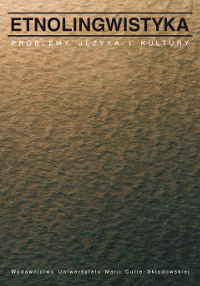Punkty dyskusyjne w rozumieniu pojęcia językowego obrazu świata – widziane z perspektywy badań porównawczych
Problematic questions in the Linguistic Worldview conception: A comparative viewpoint
Author(s): Renata GrzegorczykowaSubject(s): Applied Linguistics, Cognitive linguistics
Published by: Wydawnictwo Naukowe Uniwersytetu Marii Curie-Sklodowskiej
Keywords: linguistic worldview; national identity; structural linguistics; cognitive linguistics
Summary/Abstract: The paper deals with two questions. The first question concerns the range of the speaker’s „mental picture” of the object being denoted. Classical (structural) linguistics and logical semantics concentrate on the essential features of the object (the necessary and sufficient conditions in classifying the object as a member of a class), whereas cognitive linguistics tends to treat all features associated with the object as valid for the mental picture of this object. The non-essential features are either entrenched in language use (e.g. derivations, proverbs, etc.), or are individually created in text. The second question concerns the ontological character of the denoted objects. The object can be ontologically relatively independent, e.g. natural beings (plants, animals), certain artifacts (buildings, tables), or it may be an entity identifiable through the human cognitive and linguistic categorization of the world (body parts, certain sets or collections, the emotional states of a person). Some objects can be human mental constructions, such as theoretical models or social ideologies. The ontological character of the objects is essential for establishing the tertium comparationis in comparative research.
Journal: Etnolingwistyka. Problemy Języka I Kultury
- Issue Year: 21/2009
- Issue No: 21
- Page Range: 15-29
- Page Count: 15
- Language: Polish

